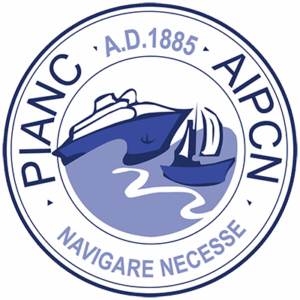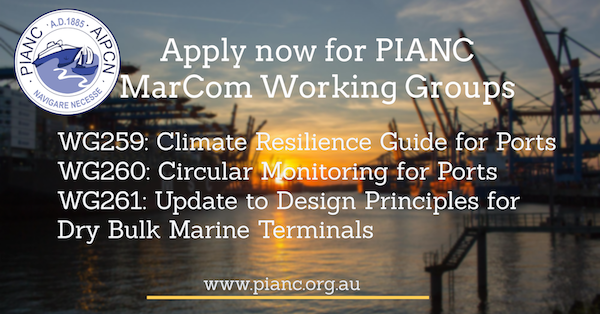PIANC’s Maritime Commission has established three new Working Groups. Apply now to be part of the future!
WG259: CLIMATE RESILIENCE GUIDE FOR PORTS
WG260: CIRCULAR MONITORING FOR PORTS
WG261: AN UPDATE TO DESIGN PRINCIPLES FOR DRY BULK MARINE TERMINALS
Close of applications Saturday 6 July 2024!
Please advise if you qualify as a Young Professional (40 years or younger) as there are two positions available in each Working Group, one of which is for a YP.
About the Working Groups:
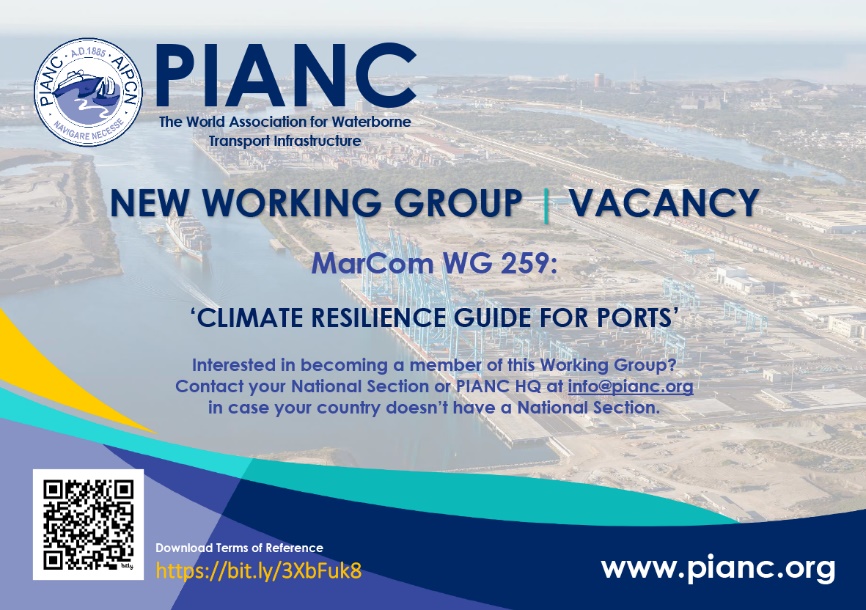
The objective of this Working Group report will be to develop a clear, consistent and comprehensive approach to analysing and demonstrating the climate-resilience of (new and existing) port infrastructure. E.g., incorporation of climate risk considerations into project and asset design and operations that address financial and/or environmental & social underperformance that may result from direct and indirect climate change impacts on the
project.
This port-focused good practice guide will draw on, rather than duplicate, content that already exists in relevant PIANC publications and develop additional content as needed. It should also contain impacts already shown and lessons learned how to mitigate these impacts, including monitoring solutions and impact management and preventive adaptation.
See full Terms of Reference here.
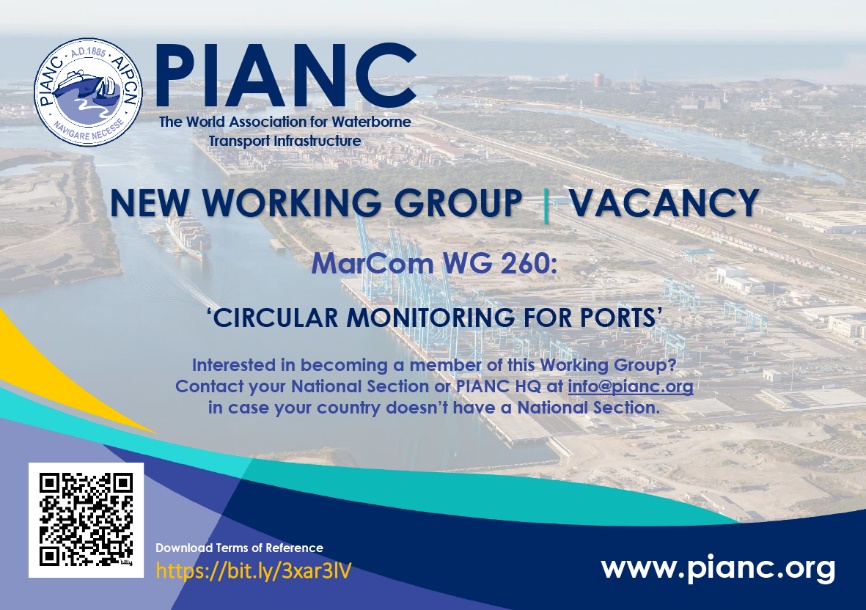
Ports are today expected to play a significant role in the transition towards a circular economy.
They should not only facilitate regional and global transport flows within circular production chains, but also host circular activities in their port areas.
The mission of the proposed Working Group is to provide a set of indicators for controlling and
stimulating the circular transition of ports. This Working Group aims to analyse the drivers for
(standardized) circular monitoring, and common definition, relevance, and data-feasibility of
circular indicators for ports. The higher ambition of the Work group lies in a wider acceptance
and adoption of a set of circular indicators, which serve as a starting basis for circular transition
dashboard for ports. See full Terms of Reference here.
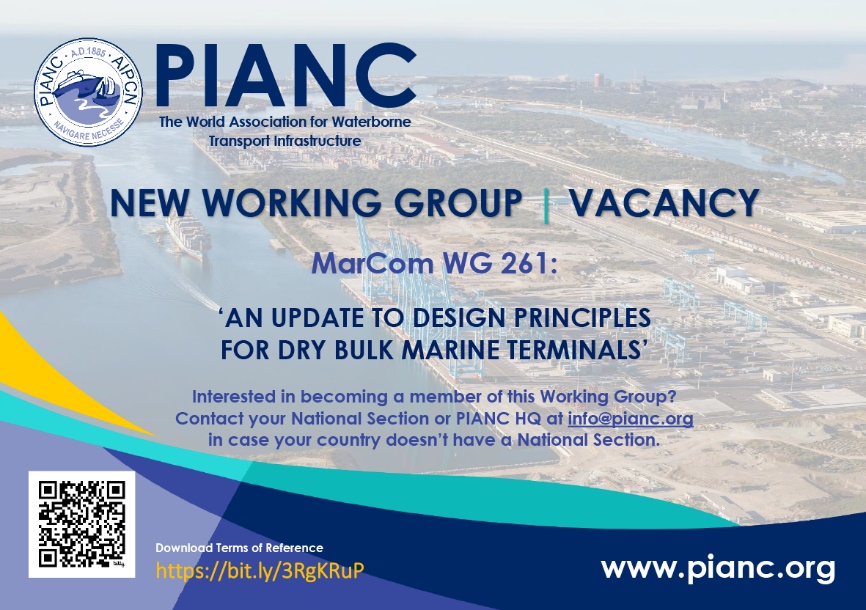
This Working Group aims to refine the WG184 document and keep the document current so that the guideline continuously acts as a useful reference for designing, operating and maintaining dry bulk terminals in line with the other relevant emerging PIANC guidelines.
Given the recent developments in the industry, it is timely to update the WG184 document.
The newly introduced PIANC guideline, WG235 (Oceangoing Ship Data for Port Planning and Design), supersedes certain information in WG184. Additionally, the ongoing development of WG211 (Guidelines for the design of fender systems) will replace the fender design methodology described in WG184. Furthermore, WG184 requires refinement to eliminate overlapping information presented across different chapters. The group also identified that the materials handling section should be upgraded in the revised document. See full Terms of Reference here.
Interested in being part of either of these International Working Groups?
If you would like to represent the Australian & New Zealand National Section of PIANC on any of these Maritime Commission Working Groups please apply to the AU-NZ Board.
Many of our members are currently active on a number of PIANC Working Groups and they produce significant outcomes that benefit maritime matters in our region. They also bring significant benefits to participants who get to meet, learn from and share with global experts.
How to Apply
Please forward your application before COB Saturday 6 July 2024 to PIANC AU-NZ Technical Commission Leads.
Apply to Scott Keane (MarCom Lead for PIANC AU-NZ) Scott.keane@stantec.com
You must also cc PIANC AU-NZ EO Paul Weston, E: Paul.weston@pianc.org.au and Greg Britton, Technical Commission Lead AU-NZ. E: greg.britton@rhdhv.com
Process for Applications
Your application should include a detailed CV/Resume with a short covering letter outlining:
1. Your experience in the particular technical field; see expertise list above.
2. Why the WG is relevant for the Australian / NZ content and the direct benefits of participation;
3. A commitment that you will prepare (for distribution to all members) a short report providing an overview & outcomes of the WG etc;
4. Whether or not you are seeking to access Travel Assistance Policy (TAP )funding; and
5. Whether you qualify as a Young Professional.
Eligibility:
Please note that Working Group Members need to be Individual Members of PIANC, working for a Corporate Member or Platinum Partner, be an invited expert or a be a member of a Sister Organisation.
Process:
A Selection Committee will review all nominations received and make a final recommendation to the PIANC AU-NZ Chair.
Responsibilities:
Please be aware that membership of a Working Group does require your active participation. This includes attending Working Group meetings (pre-Covid -19 this was usually at international locations) or as a ‘Corresponding Member’ if you do not want to undertake the normal travel requirements of full membership. If you are expert in the field and would like to influence the outcome of the Working Group we encourage you to participate as fully as you are able.
Costs:
All costs associated with membership must be borne by either yourself or your employer, however PIANC Australia & New Zealand has a Travel Assistance Policy to partially assist with travel & attendance at Working Group meetings, in order to promote Australian and New Zealand technical input into these important WG activities.
Under the PIANC AU-NZ Travel Assistance Policy (TAP), up to $2,000 funds may be payable post travel upon the successful completion of a WG Summary Report and production of relevant travel receipts.
